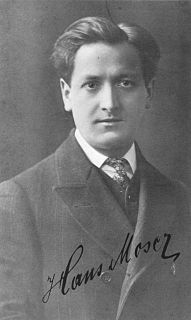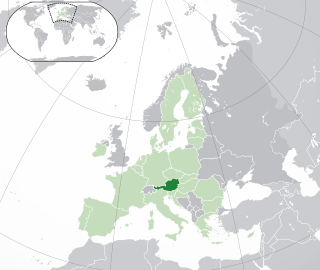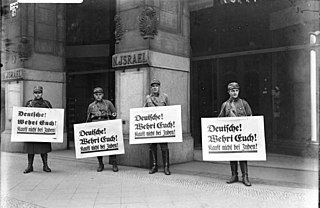Related Research Articles

Karl Lueger was an Austrian politician, mayor of Vienna, and leader and founder of the Austrian Christian Social Party. He is credited with the transformation of the city of Vienna into a modern city. The populist and antisemitic politics of his Christian Social Party are sometimes viewed as a model for Adolf Hitler's Nazism.

Ignaz Seipel was an Austrian prelate, Catholic theologian and politician of the Christian Social Party. He was its chairman from 1921 to 1930 and served as Austria's federal chancellor twice, from 1922 to 1924 and 1926 to 1929. Seipel's terms in office saw the reorganization of the state's finances and passage of the 1929 amendment to the federal constitution that strengthened the role of the Austrian President. As chancellor he opposed the Social Democratic Party of Austria and Austromarxism and supported paramilitary militias such as the Heimwehr, an organization similar to the German Freikorps.

Moses Joseph Roth was an Austrian journalist and novelist, best known for his family saga Radetzky March (1932), about the decline and fall of the Austro-Hungarian Empire, his novel of Jewish life Job (1930) and his seminal essay "Juden auf Wanderschaft", a fragmented account of the Jewish migrations from eastern to western Europe in the aftermath of World War I and the Russian Revolution. In the 21st century, publications in English of Radetzky March and of collections of his journalism from Berlin and Paris created a revival of interest in Roth.

Hans Moser was an Austrian actor who, during his long career, from the 1920s up to his death, mainly played in comedy films. He was particularly associated with the genre of the Wiener Film. Moser appeared in over 150 films.

Jakob Wassermann was a German writer and novelist.

The history of the Jews in Austria probably begins with the exodus of Jews from Judea under Roman occupation. Over the course of many centuries, the political status of the community rose and fell many times: during certain periods, the Jewish community prospered and enjoyed political equality, and during other periods it suffered pogroms, deportations to concentration camps and mass murder, and antisemitism. The Holocaust drastically reduced the Jewish community in Austria and only 8,140 Jews remained in Austria according to the 2001 census, though other estimates place the current figure at 9,000, 15,000, or 20,000 people, if accounting for those of mixed descent.
Otto Rothstock was an Austrian living in Germany, who assassinated Jewish writer Hugo Bettauer.
Ida Jenbach was an Austrian playwright and screenwriter for German and Austrian cinema during the 1920s. She was one of the authors of the spirited farce Opera Ball that appeared at the Little Carnegie Playhouse in New York City in 1931. New York Times critic Mordaunt Hall praised this comedy as “cleverly acted by the principals.” The Opera Ball (Opernredoute) was a German film that had “captions in English lettered on the scenes to keep those unfamiliar with German au courant of what is happening.”
Hans Karl Breslauer, born Johann Karl Breslauer, later often known as H. K. Breslauer, was an early Austrian film director, also an actor, screenwriter and author.

The Nazi boycott of Jewish businesses in Germany began on April 1, 1933, and was claimed to be a defensive reaction to the anti-Nazi boycott, which had been initiated in March 1933. It was largely unsuccessful, as the German population continued to use Jewish businesses, but revealed the intent of the Nazis to undermine the viability of Jews in Germany.

The Nisko Plan was an operation to deport Jews to the Lublin District of the General Governorate of occupied Poland in 1939. Organized by Nazi Germany, the plan was cancelled in early 1940.

Maximilian Hugo Bettauer was a prolific Austrian writer and journalist, who was murdered by a Nazi Party follower on account of his opposition to antisemitism. He was well known in his lifetime; many of his books were bestsellers and in the 1920s a number were made into films, most notably Die freudlose Gasse, which dealt with prostitution, and Die Stadt ohne Juden, a satire against antisemitism.

The City Without Jews is a 1924 Austrian Expressionist film by Hans Karl Breslauer, based on the novel of the same title by Hugo Bettauer. The film is one of the few surviving Expressionist films from Austria and has therefore been well researched. The film was first shown on 25 July 1924 in Vienna.
The history of the Jews in Vienna, Austria, goes back over eight hundred years. There is evidence of a Jewish presence in Vienna from the 12th century onwards.
Evidence for the presence of Jewish communities in the geographical area today covered by Austria can be traced back to the 12th century. In 1848 Jews were granted civil rights and the right to establish an autonomous religious community, but full citizenship rights were given only in 1867. In an atmosphere of economic, religious and social freedom, the Jewish population grew from 6,000 in 1860 to almost 185,000 in 1938. In March 1938, Austria was annexed by Nazi Germany and thousands of Austrians and Austrian Jews who opposed Nazi rule were sent to concentration camps. Of the 65,000 Viennese Jews deported to concentration camps, only about 2,000 survived, while around 800 survived World War II in hiding.

Berlin Without Jews is a 1925 dystopian novel by Arthur Landsberger. It is written from the point-of-view of two German families friendly to each other; the Oppenheims are Jewish, and the Rudenbergs are Lutherans. In the events of the book, a right-wing nationalist political party takes power and expels German Jews. The other factions of German politics and society stand by, doing nothing, thinking the Jews matter little. The expulsion has unfortunate consequences for Germany. German life is poorer both culturally and economically without the Jews, and the novel ends with the government sheepishly inviting the German Jews back and welcoming them as valued members of society.

Clara Pollaczek was a Viennese writer of light novels, stories and verse. She also wrote several stage works. Some of her works appeared under the pseudonyms "Bob" or "Bob Béol".
From 4 to 7 November 1938, thousands of Jews were deported from Slovakia to the no-man's land on the Slovak−Hungarian border. Following Hungarian territorial gains in the First Vienna Award on 2 November, Slovak Jews were accused of favoring Hungary in the dispute. With the help of Adolf Eichmann, Slovak People's Party leaders planned the deportation, which was carried out by local police and the Hlinka Guard. Conflicting orders were issued to target either Jews who were poor or those who lacked Slovak citizenship, resulting in chaos.

The Holocaust in Austria was the systematic persecution, plunder and extermination of Jews by German and Austrian Nazis from 1938 to 1945. An estimated 65,000 Jews were murdered and 125,000 forced to flee Austria as refugees.
References
- 1 2 3 Moulton, Alexander (Winter 2002). "A Wary Silence: Karl Kraus in Interwar Vienna" (PDF). The Columbia Historical Review. Archived from the original (PDF) on 2007-03-17. Retrieved 2008-11-15.
- 1 2 3 Deborah Dwork, Robert Jan van Pelt, Robert Jan Pelt (2003). Holocaust, p. 54. W. W. Norton & Company. ISBN 0-393-32524-5.
{{cite book}}: CS1 maint: multiple names: authors list (link) - ↑ Richard S. Levy (2005). "Antisemitism, p. 69". ABC-CLIO. ISBN 1-85109-439-3.